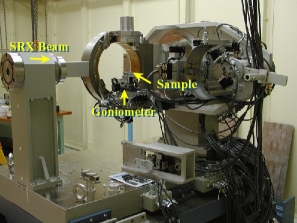BL13XU Multi-axis diffractometer positioned at the experimental hutch 1
Inquiry number
INS-0000000395
Multi-axis diffractometer positioned at the experimental hutch 1
A multi-axis diffractometer (Kohzu-Seiki TDT-17) is for structural analysis of thin films and a liquid/solid interface. Diffraction techniques available using the diffractometer are mesh scans in the reciprocal-lattice space, crystal-truncation-rod scattering, X-ray scattering in grazing incidence, reflectivity measurements in air. The instrument will be operated in either the standard four-circle (shown in Fig. 2) or five-circle, or six-circle geometry. The four-circle one features three degrees of freedom (DOF) on a sample (axes ω, χ, and φ) and 1 DOF (a 2-θ detector arm) on an X-ray detector. An analyzer crystal will be mounted on the 2-θ arm in the geometry if needed. A translation table in a horizontal and a rotation axis is attached on the detector arm (called a gamma axis), resulting in a five-circle geometry with 2 DOF on the detector. The whole instrument is mounted on a stage with vertical rotation axis (called an alpha axis) and two translation tables. The alpha axis motion enable us to use the instrument in the six-circle geometry, which is very useful for in-plane measurements under grazing incidence condition. Smallest angular steps for the axes of the multi-axis diffractometer are listed in Table 1. A Soller slit (Huber3030-I) with an acceptance angle of 0.4 degrees will be mounted to improve an X-ray signal/noise ratio if needed. An ionization chamber, a silicon PIN photodiode detector, a scintillation detector, and an image plate are available.
- Fig. 2. Multi-axis diffractometer for structural analysis of a thin film and a liquid/solid interface in experimental hutch 1
- Table 1. Smallest angular steps for the axes of the multi-axis diffractometer in a full step mode of motor drivers
Axis Step (arc sec) ω 0.09 φ 1.7289 ψ 1.8 2θ 0.72 γ 3.96 α 0.144
